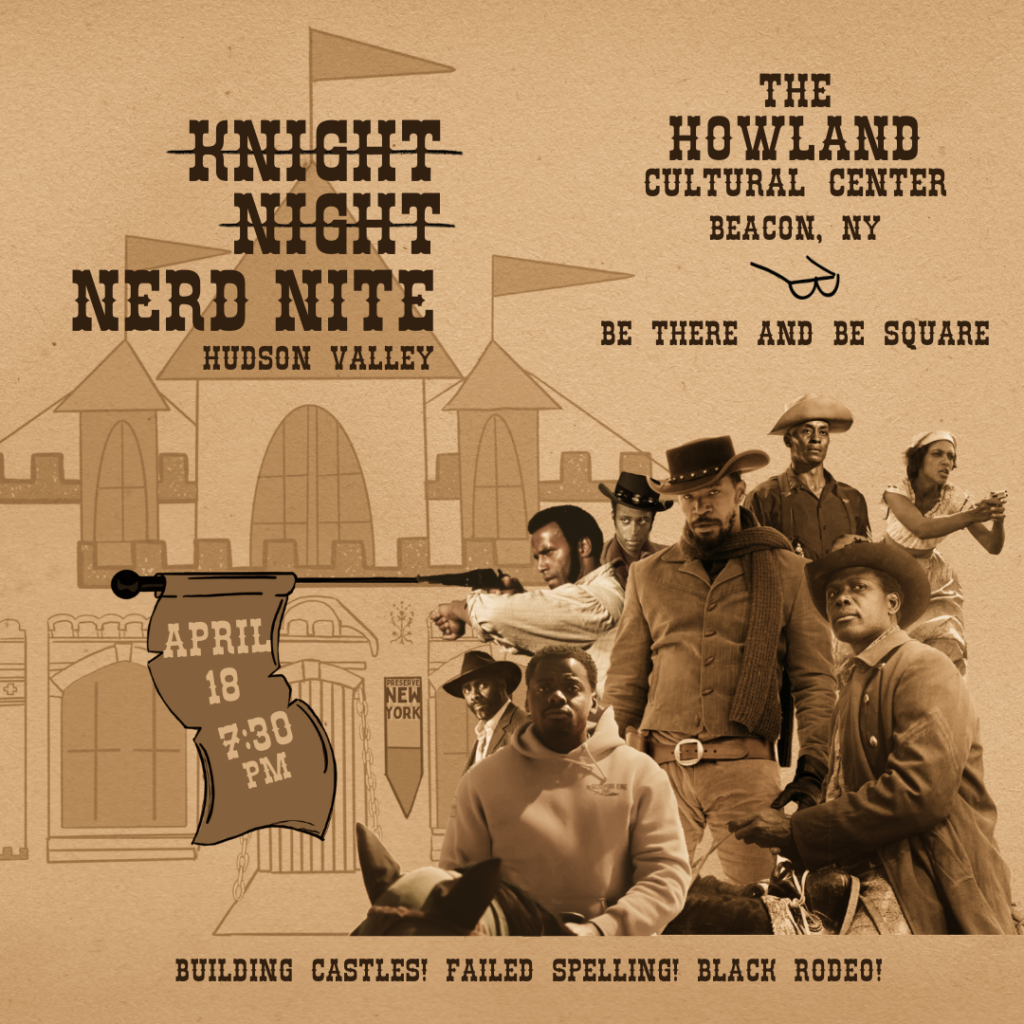
Beacon NY.
Three fun-yet-informative visual presentations about Building Castles, Failed Spelling and the History of Black Westerns. We hear from Nancy Bisaha, Professor of History and Director of Medieval & Renaissance Studies, Author Gabe Henry and Dr. Mia Mask, Professor of Film. Friday April 18th at 7:30pm at The Howland Cultural Center in Beacon, NY.
With fun music, libations and guaranteed good company: Doors at 7pm.
So You Wanna Build a Castle? by Nancy Bisaha
If you’ve ever built a castle out of sand, snow, or Legos, you understand the fascination these structures hold for us— well into adulthood. You may think you know a lot about castles, but the truth will surprise you. Unlike ancient or modern fortresses or palaces, castles are truly medieval in origin and function. For a few centuries they changed the nature of warfare and society, giving the feudal nobility a huge advantage over the other classes and reason to beat the heck out of each other. Everyone, it seems, wanted a castle, if not several of them. This talk will explain what made castles so special, how fast you could throw one up, their instrumental role in the Norman Conquest and Crusades, and why they stopped being built almost overnight.
Nancy Bisaha is Professor of History and Director of Medieval and Renaissance Studies at Vassar College. She received her BA from Rutgers College in 1990 and her PhD from Cornell University in 1997, where she worked under the direction of John Najemy. In 2004 Bisaha published Creating East and West: Renaissance Humanists and the Ottoman Turks (UPenn Press), which examines the ways in which humanists created an intellectual discourse depicting the Ottoman Turks as a cultural and religious other. In 2013 she published a translation of Aeneas Silvius Piccolomini’s De Europa in collaboration with Robert Brown. Bisaha’s third book, From Christians to Europeans: Pope Pius II and the Concept of the Modern Western Identity, was published by Routledge Press in 2023. In addition to teaching survey courses on the Middle Ages and the Renaissance, Bisaha teaches such courses as “The Dark Ages c. 400-900,” “The Crusades,” “Machiavelli and his Contemporaries,” and “Constantinople/Istanbul:1453.”
Enough is ENUF! A (Brief) History of the Simplified Spelling Movement by Gabe Henry
Why does the G in George sound different from the G in gorge? Why does C begin both case and cease? And why is it funny when a philologist faints, but not polight to laf about it? Gabe Henry explores the quirky history of the Simplified Spelling Movement, which tried for centuries to streamline our spelling by turning through into thru, laugh into laf, and enough into enuf (tu naim a few). Gabe also attempts, without shame, to sell you his new book Enough is Enuf: Our Failed Attempts to Make English Eezier to Spell. It will be available for purchase at our show.
Gabe Henry is the author of three books including the poetry anthology Eating Salad Drunk (Vulture’s Best Comedy Books of 2022), a humor collaboration with Jerry Seinfeld, Bob Odenkirk, Margaret Cho, Mike Birbiglia, Janeane Garofalo, Roy Wood Jr., and other titans of comedy. He has spent more than a decade exploring the strange and forgotten history of simplified spelling, which, by his own admission, has only made him a worse speller. He lives in New York.
Black Rodeo: A History of the African American Western by Mia Mask
The Western is easily the most impactful American Film Genre, the reinterpretation of history into cinematic mythology. Black Westerns like Buck and the Preacher, Sidney Poitier’s Directorial Debut, set the stage for modern-day westploitation films like Django Unchained. Professor and author Mia Mask covers the significance of African American Westerns, the political importance they brought to cinema, and their continued impact on today’s movies. Her book Black Rodeo: A History of the African American Western will be available for purchase at our show!
Mia Mask is the Mary Riepma Ross Professor of Film at Vassar College. She received her PhD from New York University. At Vassar, she teaches African American cinema, documentary history, African national cinemas, and genre courses. She is the author of Divas on Screen: Black Women in American Film. Mask edited the anthology Contemporary Black American Cinema and published the jointly edited collection, Poitier Revisited: Reconsidering a Black Icon in the Obama Age. Her cultural commentary has been featured on National Public Radio programs “Tell Me More,” “Marketplace” and “Morning Edition,” and in documentaries for the Smithsonian Channel, the Criterion Channel and CNN’s The Movies.